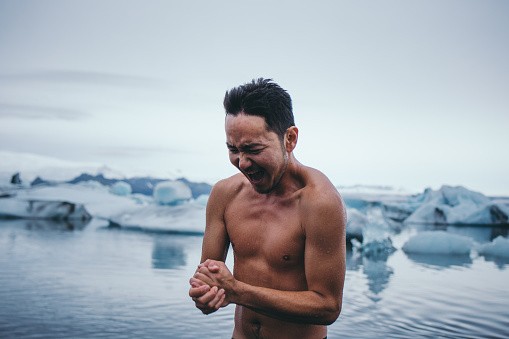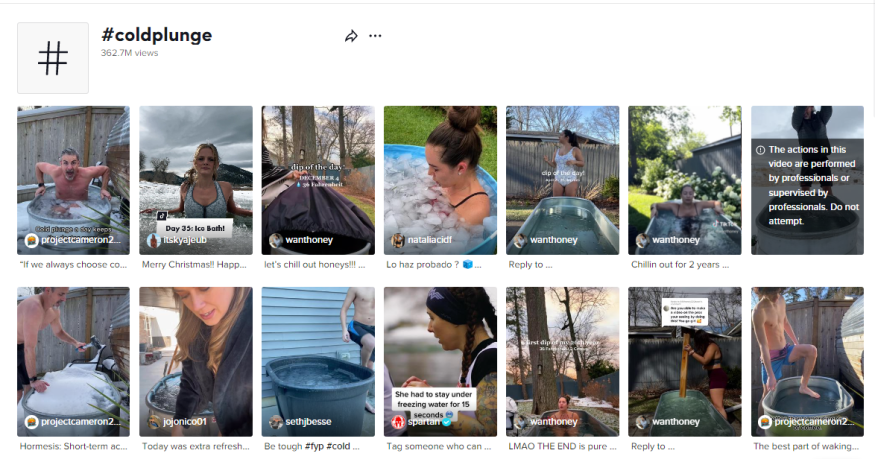Recently, the trend of plunging oneself into very cold water, known as a "cold plunge," has gained popularity on TikTok, with over 350 million views of videos featuring the hashtag #coldplunge. While the potential benefits of this practice are not yet fully understood, it is known that immersing oneself in cold water can cause the body to experience a stress response, releasing cortisol and adrenaline and resulting in feelings of alertness and wakefulness.
However, the safety of cold water immersion depends on the specific circumstances; and it may be dangerous if it is not done properly. This is according to Mike Tipton, a professor of human and applied physiology at the University of Portsmouth's Extreme Environments Laboratory in the UK.
According to Tipton, an expert on the effects of extreme environments like cold water on the body, most of the available research on the benefits of cold water immersion is based on anecdotal reports rather than controlled scientific studies. Tipton cautions that cold water immersion can be hazardous if it is not done correctly, but it can also be done safely. However, it is still not clear whether there are any actual benefits to be gained from the practice. If you are considering trying cold water immersion, it is important to carefully consider the potential risks and benefits before attempting it.
@projectcameron247365 “If we always choose comfort we never learn the deepest capabilities of our mind and body” - Wim Hof. #wimhof #coldplunge #coldtherapy #immuneboost ♬ original sound - Josh Cameron
Cold Water Immersion
For thousands of years, humans have engaged in cold water immersion as part of religious ceremonies or for exercise. More recently, some people have claimed that cold water plunges and cold water swimming can have a range of therapeutic benefits, including improving mood and immune function. According to Lee Hill, an exercise physiologist who studies cold-water swimming, the most well-researched benefit of cold-water immersion is its ability to alleviate pain. Hill is a postdoctoral fellow at the Research Institute for the McGill University Health Center in Montreal.
Based on a meta-analysis of 32 controlled trials published in the journal Physical Therapy in Sport in 2021, the use of heat or cold therapy within an hour of exercising can delay the onset of muscle soreness. Cold therapy in particular has been shown to reduce inflammation and pain perception by slowing the transmission of pain signals from pain neurons to the brain. However, it is important to note that cold immersion can also inhibit muscle regeneration and delay recovery. Hill, an expert on the effects of cold water immersion on the body, warns that it is important to carefully consider the potential risks and benefits of cold water immersion before attempting it.
Following a 2015 study published in The Journal of Physiology, cold water immersion after exercise can hinder muscle fiber growth, resulting in reduced strength and muscle mass. A review published in the European Journal of Applied Physiology in 2021 also noted that, while most research on the effects of cryotherapy (a form of cold therapy) on metabolism, inflammation, and tissue damage has been conducted using animal studies, its effects on humans are not well understood.

Cryotherapy: Cold Therapy
The review suggests that, while frequent use of cryotherapy may interfere with the benefits of exercise on muscles, occasional use of cryotherapy may help a person recover quickly and return to exercise. It is important to note that the safety and effectiveness of cryotherapy in humans have not been fully established, and more research is needed to understand its potential risks and benefits.
According to Hill, cryotherapy (a form of cold therapy) may be a promising part of treatment for conditions that cause pain. While using cold therapy after exercise may have unintended consequences, it may be useful for reducing pain and inflammation associated with conditions such as rheumatism and carpal tunnel syndrome, particularly when applied to specific parts of the body.
Hill suggests that cold water immersion may be used as an adjunct therapy, in combination with other treatments, to reduce pain and inflammation by diverting blood flow to the affected area and reducing tissue volume or inflammation. It is important to note that the safety and effectiveness of cryotherapy in humans have not been fully established, and more research is needed to understand its potential risks and benefits.
Most research on the effects of cold water on mood has focused on cold water swimming, rather than sitting in a cold water bath or standing in a cold shower. A case study published in 2018 in the journal Lifestyle Medicine detailed the experience of a 24-year-old woman in the UK who reported improvements in her mental health after four months of cold water swimming.

Cold Water's Potential Effects
It is important to note that this was a single case and further research is needed to understand the potential effects of cold water immersion on mental health. In a 2020 study published in Lifestyle Medicine, novice swimmers who participated in a 10-week course of outdoor swimming reported greater improvements in mood and well-being compared to a control group who watched them from the shore.
However, the study's authors noted that they did not isolate the specific factors that contributed to these improvements and that exercise is known to improve mood. A 2017 review published in the journal Experimental Physiology noted that preliminary studies have found that cold water immersion can stimulate the central nervous system and release hormones associated with alertness and mood, but it may also reduce the availability of serotonin, a hormone associated with feelings of well-being.
The review's authors also noted that it is possible that the social and psychological benefits of cold water swimming, rather than the cold water itself, may contribute to improvements in mental health. More research is needed to understand the potential risks and benefits of cold water immersion and its effects on mood and well-being. Both Hill and Tipton caution that the increasing popularity of cold water immersion may lead to unsafe practices. Tipton notes that humans are not well-suited to very cold water and that the quality of cold water immersion experiences can vary greatly.
Safe Cold Plunging
Hill points out that the body loses heat 25 times faster in water than in air and that cold water immersion can cause peripheral vasoconstriction, which restricts blood flow to the extremities. When the body is rewarmed after cold water immersion, the process of peripheral vasodilation occurs, causing blood vessels to dilate and pushing blood throughout the body. This process can cause hypothermia even hours after rewarming and may be dangerous for people taking medications to reduce blood pressure.
Cold water immersion can also activate both the sympathetic and parasympathetic parts of the autonomic nervous system, which can cause cardiac arrhythmias in healthy people without a history of heart disease, according to a 2012 review published in The Journal of Physiology. Additionally, the initial shock of cold water can cause hyperventilation, leading to a risk of fainting and drowning, particularly if the person's face drops below the water. Hill notes that drowning usually occurs within the first minute and that it can happen with just a small amount of water.
According to Tipton, cold water immersion can be done safely if proper precautions are taken. If you are considering cold water immersion, it is important to consult with your doctor before attempting it, even in your bathtub. It is also important to never engage in cold water immersion alone and to go with experienced swimmers or have someone present when attempting it at home. Hill advises following the 1-10-1 rule, which states that the first minute is the most dangerous time for hyperventilation and a loss of focus, followed by 10 minutes of good movement before incapacitation, at which point the risk of drowning becomes more serious. To practice cold water immersion safely, Hill recommends easing into it gradually by gradually reducing the temperature over several days or weeks, rather than attempting it all at once.
RELATED ARTICLE: Cold-Shock Protein May Be the Key To Treating Dementia
Check out more news and information on Medicine and Health in Science Times.
© 2025 ScienceTimes.com All rights reserved. Do not reproduce without permission. The window to the world of Science Times.










